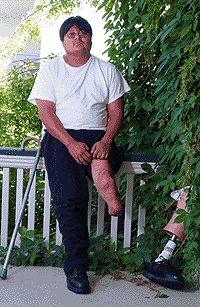 |
[http://tlpj.org/left_nav_interior.htm]
|
 |
 |
 |

Mexican
Immigrant Detained in Colorado Jail Sues Over Denial of Sanitary Housing and Medical Care That Led to Leg
Amputation
TLPJ
Joins Plaintiff’s Trial Team

Moises Carranza-Reyes charges that
inhumane treatment in a squalid jail cost him a leg. Photo by Mark
Manger. |
A
Mexican man who was detained in Colorado’s Park County Jail for an immigration
violation, but who was never charged with any crime, is suing Park County
officials, including the sheriff and the captain of the sheriff’s department,
as well as the jail’s medical staff, for denying him sanitary housing and
medical care so that his leg had to be amputated. On June 22, 2005, TLPJ announced that
it is joining a Colorado trial team in representing former detainee Moises
Carranza-Reyes, a 29-year-old whose week in the jail’s filthy, overcrowded,
and poorly heated cell block resulted in an infection that blackened his legs
with gangrene, nearly took his life, and put him in intensive care for two
months.
On March 1,
2003, Carranza-Reyes was a passenger in a truck with other immigrants,
attempting to reach Chicago
for work opportunities, when he was detained by the Bureau of Immigration and
Customs Enforcement (BICE) and transported to Park County Jail. This is a
revenue-generating, public jail whose promotional literature routinely solicits
BICE, the U.S. Marshall’s Service, and other counties to “park” their
overflow prisoners at the facility. Carranza-Reyes was placed with dozens of
other detainees in one unheated cellblock. He was forced to wear a
foul-smelling, unlaundered prison uniform and a pair of flip-flops, and had to
sleep on a soiled mattress between two inmates who were so severely ill that he
had to feed them. The cell block contained only two toilets, which were covered
with excrement and vomit, and its floors were littered with phlegm-soaked toilet
paper. Guards denied inmates’ requests
for cleaning supplies or soap. As a result, contagion spread and Carranza-Reyes
– who had entered a healthy man – contracted a streptococcal infection that
left him coughing up blood, urinating blood, and unable to stand. Although he
repeatedly requested medical treatment, he was denied timely and effective
treatment. When he and other detainees attempted to petition the Mexican
Consulate in Denver
for humane treatment, the guards took the document and destroyed it.
By the time Carranza-Reyes reached Denver General
Hospital
on March 8, 2003, he was suffering pneumonia and sepsis, went into cardiac and
respiratory arrest, and ended up in a coma. Denver General’s noble and
extraordinary efforts saved his life but not his leg. Both of his legs became
gangrenous and the left one had to be amputated below the knee. In addition,
portions of his lung were removed.
Filed on February 28, 2005,
Carranza-Reyes’s lawsuit charges the defendants
with violating his constitutional rights.
The suit also charges the jail’s medical staff with negligence. Carranza-Reyes
is represented by lead counsel Lloyd C. Kordick of
Colorado Springs, and co-counsel William A. Trine of
Boulder
and Joseph J. Archuleta of Denver.
“The jail’s actions showed an appalling disregard of the rights to sanitary
housing and adequate medical care,” said TLPJ staff attorney Adele P. Kimmel.
“Mr. Carranza-Reyes deserves compensation not only because he lost a leg, but
because the jail – a part of our American justice system – violated his
fundamental rights. The stain on our justice system can be cleansed only by
holding the wrongdoers accountable.”
“Like his father, who became an American citizen in 1996, Moises came to America
seeking economic
opportunity,” said Kordick. “He is a hardworking man, who
served honorably in the Mexican Army and the Mexico City Police. He believed his
father’s status as a
U.S.
citizen, and his father’s attempts to gain citizenship for him and his twin
brother Abraham, would permit them to become U.S.
citizens as well.”
Trine said that this case exemplifies problems with running a prison like a
business. “Park County Jail’s attempt to boost its net revenues caused it to
cut basic human essentials, such as heat, clean laundry, medical care,” he
said. “A recent state audit of
Colorado’s private prisons showed that, as a result of prison profiteering, we’re
seeing human rights abuses that we’d never expect to see in this country.”
Carranza-Reyes’ legal team is requesting a jury trial in federal court. The
complaint in Carranza-Reyes v. Park County is
posted on TLPJ’s web site, www.tlpj.org.
|  |
 |
